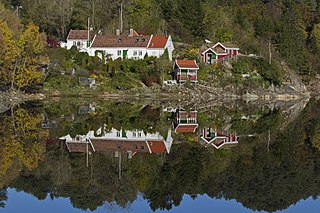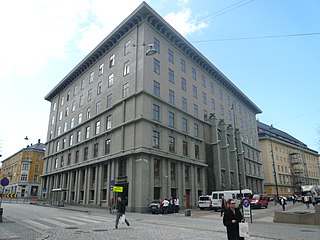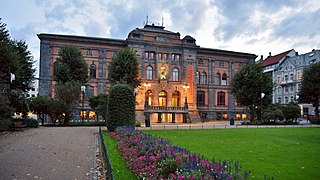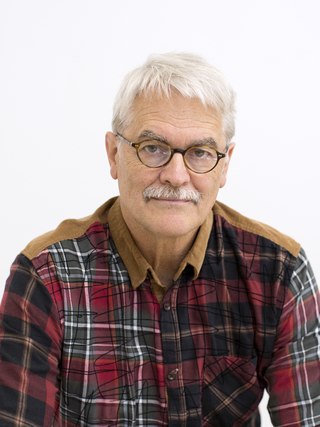
Bergen, historically Bjørgvin, is a city and municipality in Vestland county on the west coast of Norway. As of 2022, its population was roughly 289,330. Bergen is the second-largest city in Norway after the national capital Oslo. The municipality covers 465 square kilometres (180 sq mi) and is located on the peninsula of Bergenshalvøyen. The city centre and northern neighbourhoods are on Byfjorden, 'the city fjord'. The city is surrounded by mountains, causing Bergen to be called the "city of seven mountains". Many of the extra-municipal suburbs are on islands. Bergen is the administrative centre of Vestland county. The city consists of eight boroughs: Arna, Bergenhus, Fana, Fyllingsdalen, Laksevå

The University Museum of Bergen is a university museum in Bergen, Norway. The museum features material related to anthropology, archaeology, botany, geology, zoology, art, and cultural history.
The Bryggen inscriptions are a find of some 670 medieval runic inscriptions on wood and bone found from 1955 and forth at Bryggen in Bergen, Norway. It has been called the most important runic find in the twentieth century. Before the find of these inscriptions, there was doubt whether the runes were ever used for anything else than inscriptions of names and solemn phrases. The Bryggen find showed the everyday use that runes had in this area, and presumably in other parts of Scandinavia as well. Another important aspect of the find was that many of the inscriptions were obviously at least as recent as the 14th century. Previously it was believed that the use of runes in Norway had died out long before.

Hanseatic Museum and Schøtstuene is a museum in the city of Bergen, Norway.

Alvøen or Alvøy is a manor house located on a historic industrial site in the Laksevåg borough of the city of Bergen in Vestland county, Norway. Alvøen Manor was once one of the grander private homes in Bergen.

Johan Olaf Brochmann Nordhagen was a Norwegian educator, architect, engineer and artist. He is most commonly associated with his restoration designs for Nidaros Cathedral in Trondheim, Norway.

Bergen Tramway was a tram in Bergen, Norway. It was in operation from 1897 to 1965. The first three lines were opened on 29 June 1897. Starting in 1950, tramway lines were gradually replaced with bus and trolleybus routes. The last line closed in 1965. Since 1993, a heritage tram is operated in Møhlenpris by the Bergen's Electric Tramway association. A light rail system was proposed in 1995, adopted in the 2000s and started operating in 2010.

Munkeliv Abbey was a Benedictine abbey located at Nordnes in Bergen, Norway. It was one of the oldest monasteries in Norway, and also one of the wealthiest and best-documented. There are no visible remains today.

The Norwegian Glacier Museum is a museum in Fjærland, Vestland county, Norway.

Jakob Weidemann was a Norwegian artist. Jakob Weidemann is regarded as one of Norway's more important artists of post-war Modernism. Weidemann's work Storfuglen letter (1959) was selected as one of the twelve most important Norwegian artworks by Morgenbladet.

The Buekorps Museum (Buekorpsmuseet) is a museum in Bergen, Norway. It is dedicated to the traditional neighborhood youth marching organization, Buekorps.

Vågen is a bay in the centre of the city of Bergen in Vestland county, Norway. It is the central harbour of the city centre, and is the center of the historical core of the city. The city of Bergen originated on the east shore of the bay, and from there it expanded to the southern and western shores over a few centuries. Today, Bergen is the second largest city in the nation.

Christinegård is a manor house located in the neighborhood of Sandviken in Bergen, Norway. The villa has a dominant position in the hillside overlooking Byfjorden.

Einar Oscar Schou was a Norwegian architect. He is most noted for his design of Den Nationale Scene in Bergen, Norway.

Salo Grenning, pen name Pedro was a Norwegian illustrator.

Bergen District Court was a district court in Vestland county, Norway. The court was based in the city of Bergen at the Bergen Courthouse at Tårnplads 2 in Bergen. The court existed until 2021. It had jurisdiction over the Nordhordland, Midhordland, and Voss regions in the county. This included the municipalities of Gulen, Fedje, Austrheim, Masfjorden, Modalen, Alver, Askøy, Øygarden, Osterøy, Vaksdal, Voss, Austevoll, Bjørnafjorden, Samnanger, and Bergen. Cases from this court could be appealed to Gulating Court of Appeal.
Elise Eskilsdotter was a Norwegian noble. Elise was the daughter of Eskild Ågesen and Elisabeth Jakobsdatter Hegle. Her father was a knight from Scania. Around 1420, she married the Norwegian nobleman Olav Nilsson who was a member of the noble Skanke family.

Asbjørn Herteig was a Norwegian archeologist. He was the first curator at the Bryggen Museum and affiliated with the University of Bergen.

The West Norway Museum of Decorative Art, also referred to as KODE 1, is located in Bergen, Norway. It was established in 1887 at the initiative of Johan Bøgh. In 1896 the museum moved into a permanent exhibition building, a Renaissance Revival structure designed by Henry Bucher (1864–1944). The building caught fire during the 1916 Bergen fire but was saved.

Peter Esdaile is a Norwegian painter, sculptor, and printmaker born in Canada. Esdaile was educated in the period 1966–1973 at the National Academy of Craft and Art Industry, and at the National Academy of Fine Arts where he received his MFA. He studied under Chrix Dahl, Åge Storstein, Ludvig Eikaas, Halvdan Ljøsne, and Arne Malmedal.


















